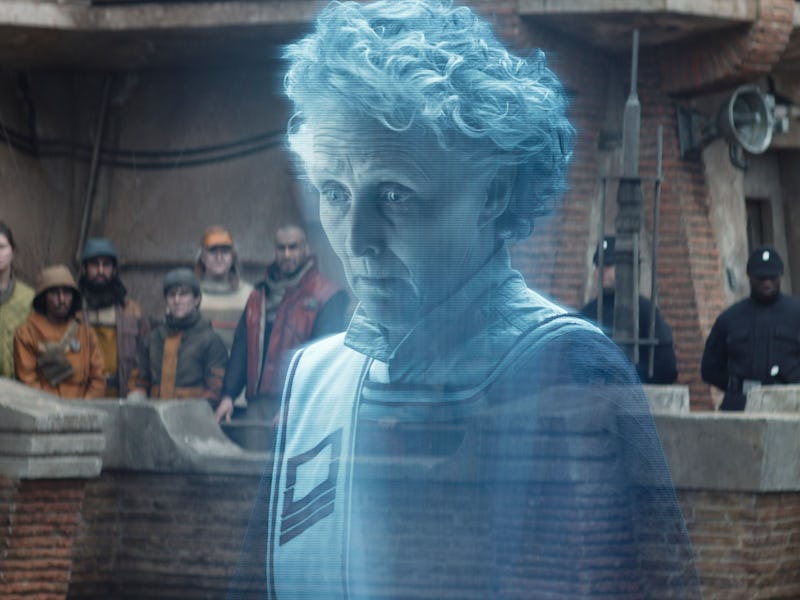Star Wars finally masters George Lucas' biggest weakness
There’s nothing like an inspiring speech.

When you think about your favorite Star Wars moments, what do you picture? The medal ceremony? The reveal of Luke Skywalker’s parentage? Qui-Gon vs. Darth Maul or Obi-Wan vs. Anakin? These are all memorable moments, but unlike in many other sci-fi franchises, they’re famous because of what happens, not what’s said. Granted, what happens is awesome, but Star Wars isn’t exactly known for great action and great dialogue. For every “Tragedy of Darth Plagueis the Wise” there’s “I don’t like sand.”
Andor’s final episode changed that. Star Wars finally has the last Infinity Stone in its proverbial gauntlet of epic storytelling: The monologue.
You can’t watch modern television without running into a monologue. Mike Flanagan has created a Netflix empire with his monologue-heavy horror scripts. House of the Dragon loved to build up to an epic speech by one of its many characters. Even Doctor Who loves a climactic speech.
But in Star Wars, brevity is the soul of speech. Din Djarin is a man of few words, and Grogu is a baby of even fewer. Boba Fett and Obi-Wan dispense a few snippets of wisdom, but they mostly trudge and fight across Tatooine. There are a few speeches in The Clone Wars, but that’s about it. Dialogue wasn’t George Lucas’ strength, to put it mildly, and other projects have followed his lead by putting action at the forefront.
But Andor has felt different than its predecessors, and its use of monologues underlines what makes it unique. Even before the Season 1 premiere, we got a juicy monologue from Cassian in a preview clip. “To steal from the Empire? What do you need? A uniform, some dirty hands, and an Imperial tool kit,” he tells Luthen. “They’re so proud of themselves, they don’t even care. They’re so fat and satisfied, they can’t imagine it.”
This precedent was carried through the rest of Andor, with characters like Kino Loy coming into their own with powerful speeches. In Episode 12, the climactic moments of the Rebellion’s rise are underlined by three monologues from three dead figures in Cassian’s life, delivered in the order he lost them.
First, a flashback shows Clem, Cassian’s adopted father and the source of his alias, as he teaches a young Cassian about the ignorance of those above him. “People don’t look down to where they should. They don’t look down, they don’t look past the rust,” he says.
He’s talking about cleaning and selling old equipment, but he’s also talking about power. Clem teaches Cassian not to underestimate the underdog just because they’re not as sophisticated. The people of Ferrix may be rusty and looked down on, but they’re strong.
A hologram of Maarva speaks to the people of Ferrix.
Then, Aldhani heist martyr Nemik speaks in voiceover as Cassian reads the manifesto he was entrusted with. “Tyranny requires constant effort. It breaks, it leaks. Authority is brittle. Oppression is the mask of fear,” Nemik says. It’s the reminder Andor needs to realize the Rebellion isn’t hopeless. If anything, it’s the Empire that’s doomed.
Finally, Maarva, Cassian’s beloved mother, gives her own eulogy on Rix Road, which she ends with a call to action that kicks off a riot and, in many ways, the Rebellion itself. “The Empire is a disease that thrives in darkness,” Maarva says. “It is never more alive than when we sleep.” And just like that, the people of Ferrix wake up to the space fascism around them. Even Maarva joins in on the fight from beyond the grave, as the brick her remains became make for a handy weapon.
It was spectacle that made Star Wars great, not speeches, but good monologues are helping make Andor a prestige show. It’s another facet of the Star Wars universe, and hopefully the start of a trend. We know why superheroes like Obi-Wan and Boba Fett fight, but why do everyday people do it? This is how rebellion starts: With a good speech.
Andor Season 1 is now streaming on Disney+.
This article was originally published on